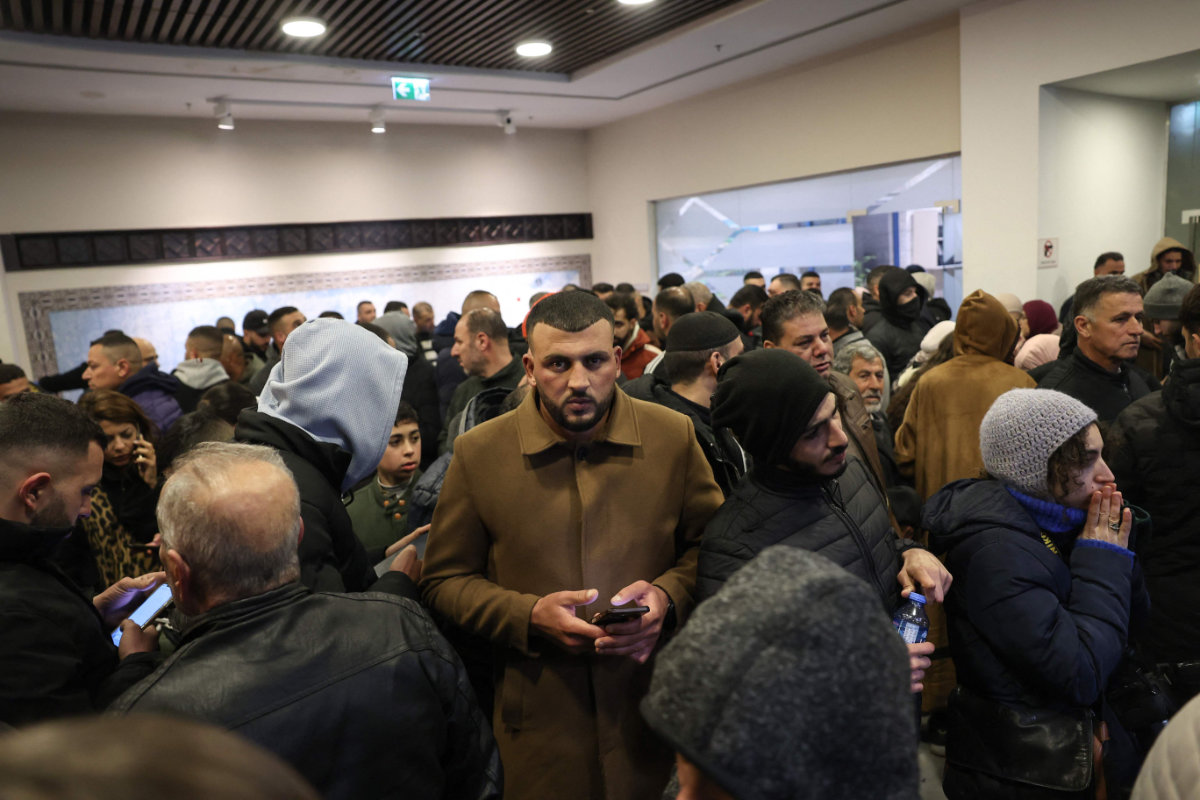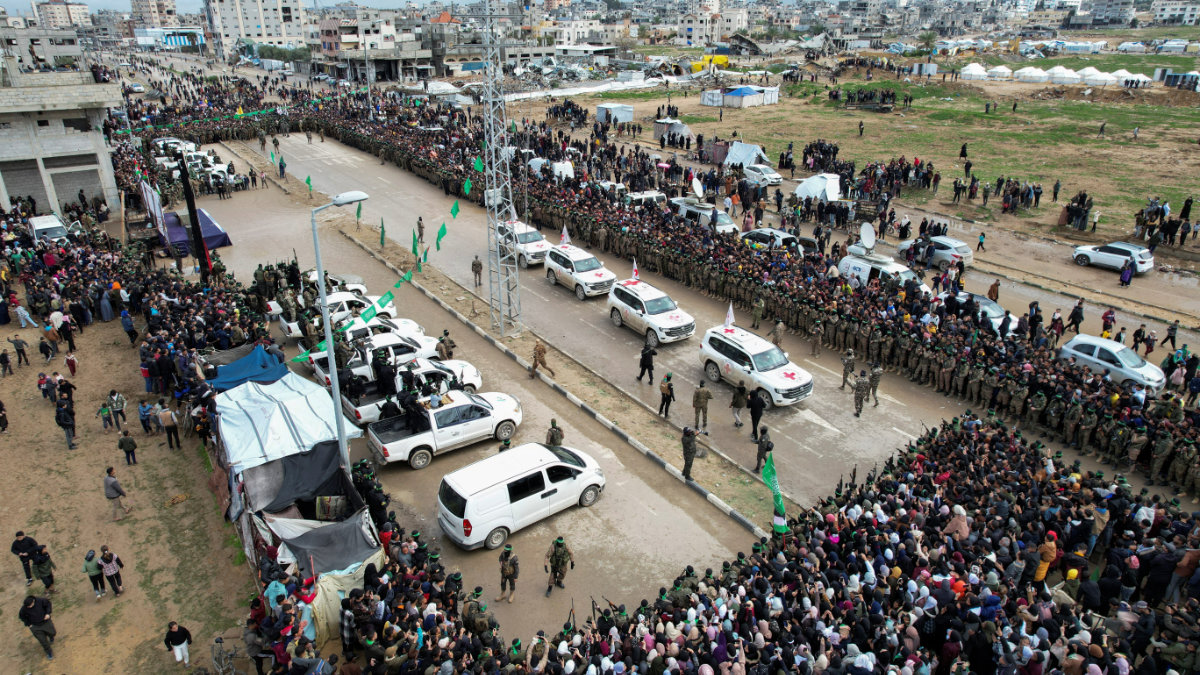DEIR AL-BALAH, Gaza Strip: Israeli strikes killed at least 51 people in southern Gaza overnight, including women and children, as the military launched ground operations in the hard-hit city of Khan Younis, Palestinian medical officials said Wednesday.
Israel has continued to strike what it says are militant targets across Gaza nearly a year after Hamas’ Oct. 7 attack ignited the war there, and even as attention has shifted to Lebanon and Iran. Israel has launched ground operations against Hezbollah in Lebanon, and Tehran fired ballistic missiles on Israel late Tuesday.
Separately, Hezbollah said its fighters clashed with Israeli troops in the Lebanese border town of Odaisseh, forcing them to retreat.
There was no immediate comment from the Israeli military or independent confirmation of the fighting, which would mark the first ground combat since Israeli troops crossed the border this week. Israeli media reported infantry and tank units operating in southern Lebanon after the military sent thousands of additional troops and artillery to the border.
The military warned residents to evacuate another 24 villages in southern Lebanon after making a similar announcement the day before. Hundreds of thousands have already fled their homes as the conflict has intensified.
Palestinians describe massive raid in Gaza
The Health Ministry in Gaza said at least 51 people were killed and 82 wounded in the operation in Khan Younis that began early Wednesday. Records at the European Hospital show that seven women and 12 children, as young as 22 months old, were among those killed.
Another 23 people, including two children, were killed in separate strikes across Gaza, according to local hospitals.
The Israeli military did not immediately respond to a request for comment.
Residents said Israel had carried out heavy airstrikes as its ground forces staged an incursion into three neighborhoods in Khan Younis. Mahmoud Al-Razd, a resident who said four relatives were killed in the raids, described heavy destruction and said first responders had struggled to reach destroyed homes.
“The explosions and shelling were massive,” he told The Associated Press. “Many people are thought to be under the rubble, and no one can retrieve them.”
Israel carried out a weekslong offensive earlier this year in Khan Younis that left much of Gaza’s second largest city in ruins. Over the course of the war, Israeli forces have repeatedly returned to areas of Gaza where they have previously fought Hamas and other armed groups as the militants have regrouped.
Hamas-led militants killed some 1,200 people, mostly civilians, on Oct. 7 and took around 250 hostage. Around 100 are still in captivity in Gaza, a third of whom are believed to be dead.
Israel’s retaliatory offensive has killed over 41,000 Palestinians, according to local health authorities, who do not say how many were fighters but say a little more than half were women and children. The military says it has killed over 17,000 militants, without providing evidence.
Iran fires missiles to avenge attacks on militant allies
Iran launched at least 180 missiles into Israel on Tuesday in what it said was retaliation for a series of devastating blows Israel has landed in recent weeks against Hezbollah, which has been firing rockets into Israel since the war in Gaza began.
Israelis scrambled for bomb shelters as air raid sirens sounded and the orange glow of missiles streaked across the night sky.
The Israeli military said it intercepted many of the incoming Iranian missiles, though some landed in central and southern Israel and two people were lightly wounded by shrapnel.
Several missiles landed in the Israeli-occupied West Bank, where one of them killed a Palestinian worker from Gaza who had been stranded in the territory since the war broke out.
Israeli Prime Minister Benjamin Netanyahu vowed to retaliate against Iran, which he said “made a big mistake tonight and it will pay for it.”
US President Joe Biden said his administration is “fully supportive” of Israel and that he’s in “active discussion” with aides about what the appropriate response should be.
Iran said it would respond to any violation of its sovereignty with even heavier strikes on Israeli infrastructure.
Hezbollah and Hamas are close allies backed by Iran, and each escalation has raised fears of a wider war in the Middle East that could draw in Iran and the United States, which has rushed military assets to the region in support of Israel.
Iran said it fired Tuesday’s missiles as retaliation for attacks that killed leaders of Hezbollah, Hamas and the Iranian military. It referenced Hezbollah leader Hassan Nasrallah and Revolutionary Guard Gen. Abbas Nilforushan, both killed in an Israeli airstrike last week in Beirut. It also mentioned Ismail Haniyeh, a top leader in Hamas who was assassinated in Tehran in a suspected Israeli attack in July.
The UN Security Council scheduled an emergency meeting for Wednesday morning to address the escalating situation in the Middle East.
Israel says its forces are operating in Lebanon
Israel is meanwhile carrying out what it says are limited ground incursions into southern Lebanon. Israeli airstrikes and artillery have been pounding southern Lebanon as Hezbollah fires dozens of rockets, missiles and drones into Israel, where there have been few casualties.
Israel has said it will continue to strike Hezbollah until it is safe for tens of thousands of its citizens displaced from homes near the Lebanon border to return. Hezbollah has vowed to keep firing rockets into Israel until there is a ceasefire in Gaza with Hamas.
Israel has warned people in southern Lebanon to evacuate to the north of the Awali River, some 60 kilometers (36 miles) from the border and much farther than the Litani River, which marks the northern edge of a UN-declared zone intended to serve as a buffer between Israel and Hezbollah after their 2006 war. The border region has largely emptied out over the past year as the two sides have traded fire.
Israeli strikes have killed over 1,000 people in Lebanon over the past two weeks, nearly a quarter of them women and children, according to the Health Ministry. Hundreds of thousands have fled their homes.
Hezbollah is a widely seen as the most powerful armed group in the region, with tens of thousands of fighters and an arsenal of 150,000 rockets and missiles. The last round of fighting in 2006 ended in a stalemate, and both sides have spent the past two decades preparing for their next showdown.
Palestinian officials say 51 killed in Israeli strikes on southern Gaza
https://arab.news/vvbsu
Palestinian officials say 51 killed in Israeli strikes on southern Gaza

- Israel continues to strike Gaza despite its attention shifting to conflicts with Lebanon and Iran
- Records at European hospital show seven women and 12 children were among 51 killed


























